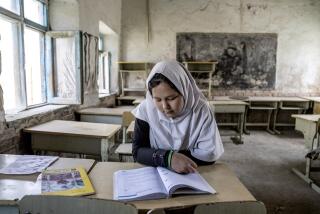Opening Afghan Eyes With Mascara and Beauty Classes
- Share via
KABUL, Afghanistan — For Afghan women, going out still usually involves little more than throwing on a burka before leaving the house. But two American “beauticians without borders” are introducing Afghans to Western-style ideas of womanhood by teaching them the finer points of applying lipstick.
About 25 students have been chosen for an eight-month beautician course by Debbie Rodriguez and Patricia O’Connor, who were dismayed by the beauty regimen of local women -- and wanted to help widows and uneducated young women who have no other means of earning a living.
The million-dollar program, funded by major cosmetic companies, including Revlon, L’Oreal and Clairol, proved so popular last year that it has been continued. This year, 400 women applied.
“This educates the women.... We teach them to operate their own business,” said Rodriguez, a Michigan native. “And women here love makeup. All you have to do is go to a wedding to see that.”
Rodriguez dismissed concerns that the cosmetics firms are using the school to create a market in Afghanistan for their products. “First of all, when people here are making $30 a month -- how can they afford a $25 lipstick?” she said. “If they could afford it, that would be the best thing that could happen.”
Beauty salons have proliferated since the Taliban was ousted in 2001 and are thriving in this capital. For women, who were not allowed to leave their homes or get an education during the repressive years, opening a beauty parlor is one of the few ways they can earn money.
Beauticians can make $160 a month -- three times the national average and, in most cases, more than their husbands. In the weeks after the Taliban fled, there were only about five beauty salons in Kabul. Now there are hundreds.
Soraya Nawabi, 40, a mother of six, said she looked forward to taking the course. “We can have an independent life and help our families,” she said. “Women can become businessmen.”
The salons are socially acceptable because the women do not have to come in contact with men, a major reason most husbands refuse to allow their wives to work.
Afghan culture is caught up in a struggle between Westernization and traditionalism. When Vida Samadzai, who had attended Cal State Fullerton, walked onstage wearing a bikini as Afghanistan’s representative in last year’s Miss Earth pageant in Manila, she provoked outrage. Clerics threatened to have her arrested if she set foot in Afghanistan again.
Last year, Trina Ahmedi, 25, won the Anna Wintour Award -- named for the Vogue magazine editor -- as top student in her graduating class of the beautician program. She said the class was not always well received by Afghans uneasy over the Westernization of their culture.
“The men dislike it,” Ahmedi said. “They say, ‘Why do you have to go and learn 40 different ways of applying makeup?’ But how long do women have to be kept under the burka? We don’t want to implement the European way of living. Since we are living in a conservative society, women should wear headscarves, but she should be allowed to learn something. It is her right.”
Nafisa Omed, 40, operated a secret salon during the Taliban years. The mother of five attended the beauty school last year to update her skills and now styles hair and applies makeup for young women at her home.
Omed recalled that many of her customers during the Taliban years were wives of Islamic militants. She recognized them because they wore fashionable clothes -- the only women in the city who had the means to do so.
“A lot of them liked curly hair,” she said. “They wouldn’t ask for makeup because they never wore any. But they asked for curls in the front of their head, not the back. They wore big scarves and wrapped them in such a way that only the curls showed.”
Until this month, the beauty school had been operating out of the grounds of the Women’s Ministry in the capital, but the relationship apparently turned acrimonious in recent weeks.
Rodriguez said ministry officials complained that the school was taking too long to set up its spring session, which began about two weeks ago. Officials from the ministry were not available for comment.
Now, the school has relocated, leasing space for classes from a charity elsewhere in Kabul while a more permanent facility is being renovated.
Women attending the beauty school are taught four basic haircuts, how to color hair, how to create special hairstyles for weddings and how to apply cosmetics.
“When I first came to Kabul -- oh, my God! -- I was shocked at what these women did to their hair and face,” said Rodriguez, who has been a hairdresser for 25 years. “They would use henna, which is horrible for your hair. The scissors looked like hedge trimmers. And they used buckets from nearby wells outside to rinse hair.”
Rodriguez came to Kabul as a relief worker, but turned her skills elsewhere when she was besieged by requests to cut hair. She described the unique challenges of working as a hairdresser in this city.
“Your hair and makeup always have to look good,” she said. “But you have to schlep around the muddy streets in high heels. I can’t get my curling iron to work, and I had to put my makeup on this morning by lantern. It would be easier to be a sheepherder, because no one would care what you looked like.”
These days, most Kabul women want to look like an Indian film star, with lacquered hair, frosty lipstick and heavy foundation.
The end of Taliban rule, however, has not meant the end of the burka.
“Many are afraid to go out without a burka because of fundamentalists,” Nawabi said. “A lot of us are still afraid that we will have acid thrown on our faces, as the mujahedin used to do during the civil war years.”
More to Read
Sign up for Essential California
The most important California stories and recommendations in your inbox every morning.
You may occasionally receive promotional content from the Los Angeles Times.












